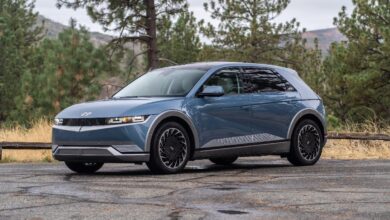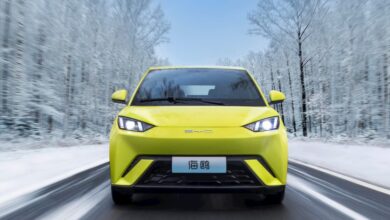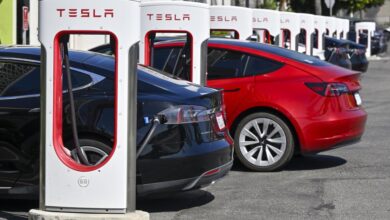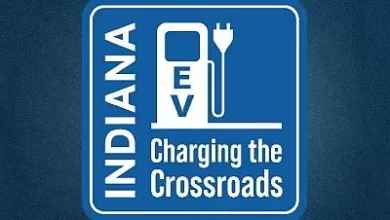Youngkin says Virginia won’t follow California’s clean car standards anymore • Virginia Mercury
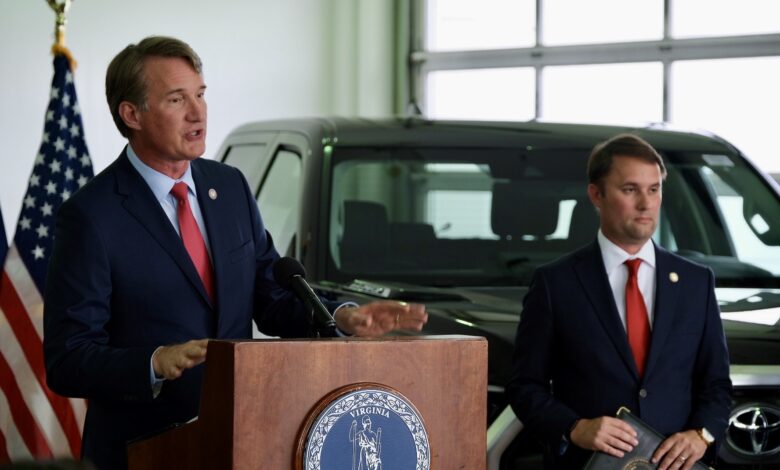
Virginia Gov. Glenn Youngkin said Wednesday that the state will no longer follow car emissions standards set by California, despite his party’s failure to repeal or roll back a 2021 Democratic law that tied Virginia to those regulations.
In Senate, Va. Democrats kill Republican attempts to roll back vehicle emissions law
The move tees up what could be another legal fight over Republican leaders’ efforts to undo climate change-related measures Democrats passed when they had full control of state government a few years ago.
The governor has already drawn a lawsuit over his decision to end Virginia’s participation in a regional program meant to curb carbon emissions from power plants, arguing the initiative was too burdensome for regular Virginians who had to absorb the cost through higher electricity bills.
Youngkin has taken a similar line of attack against California’s car emissions rules, which aim to slow climate change and reduce pollution by requiring the automotive industry to shift to selling more electric vehicles. The California standards require 100% of new cars sold to be electric vehicles starting in 2035, meaning the sale of new gas-powered vehicles would gradually be banned over the next decade.
“Once again, Virginia is declaring independence – this time from a misguided electric vehicle mandate imposed by unelected leaders nearly 3,000 miles away from the Commonwealth,” Youngkin said in a news release Wednesday morning. “The idea that government should tell people what kind of car they can or can’t purchase is fundamentally wrong.”
The governor said Virginia would stop following regulations set by the California Air Resources Board at the end of 2024.
The move drew swift condemnation from Democrats and environmental groups who said Youngkin and Attorney General Jason Miyares, whose office provided legal cover for Youngkin’s action, were overstepping their authority to try to undo a law they didn’t like.
Senate Majority Leader Scott Surovell, D-Fairfax, said “even Vladimir Putin does not claim to have this much power.”
“Governor Youngkin and Attorney General Miyares’ reckless, illegal and unconstitutional actions today are destructive of Virginia’s pro-business reputation,” Surovell said in a written statement. “Working with a legislature that has a different political orientation can be challenging, but we fought a war in 1776 to ensure that an executive would never have the powers to nullify laws by press conference.”
Virginia House of Delegates Speaker Don Scott, D-Portsmouth, dinged Youngkin again for the governor’s decision in late 2022 to scuttle talks about bringing a Ford electric vehicle battery plant to Southwest Virginia due to a Chinese company’s involvement in the project.
“We know that electric vehicles are already taking off,” Scott said Wednesday in a news release. “The demand for them is just growing more each year. If Virginians can’t find electric cars in their local dealerships, they will go out of state to buy their cars.”
Youngkin and Mirayes held a public event Wednesday afternoon at a Richmond-area Toyota dealership to explain the decision. The governor said it was not about bashing electric vehicles, but returning choices to consumers.
“I am very supportive of Virginians buying electric vehicles,” Youngkin told reporters after the event. “But I want Virginians to make that decision for themselves.”
Asked whether he agrees the planet would be better off with more people buying electric vehicles, Youngkin said he believes there’s a “real question” on that front, given the complexities of making electric vehicle batteries and generating the energy to charge them.
“Let’s just be clear, the power comes out of the wall,” Youngkin said. “And the wall has a power source that is a mix of generating capacity. And that is something that I think people forget to talk about.”
The legal justification for Wednesday’s announcement, laid out in a 9-page advisory opinion by Miyares, is that the first version of California’s standards expire at the end of the year. Though they’re being replaced with a new set of rules, Miyares opined that Virginia law doesn’t strictly require Virginia’s State Air Pollution Control Board to go along with the updated California standards.
“EV mandates like California’s are unworkable and out of touch with reality, and thankfully the law does not bind us to their regulations,” said Miyares, who’s widely considered a possible GOP candidate for governor in 2025.
The Federal Clean Air act requires states to either follow California’s admissions rules or regulations set by the federal government. Individual states don’t have the power to make their own rules, partly to avoid forcing the auto industry to make vehicles tailored to a complicated patchwork of laws that could vary from state to state. The most populous state in the nation, California was granted unique permission to craft its own regulations to address local air pollution issues.
Youngkin said the state will follow the less-strict federal emissions rules starting in 2025. Those rules still encourage the transition to electric vehicles, but on a less aggressive timeline than what California envisioned. The U.S. Environmental Protection Agency estimates new federal rules issued this year could be met if 56% of new vehicles sold are electric by 2032, according to the Associated Press. The Youngkin administration said electric vehicles made up 9% of new auto sales in Virginia last year.
The new legal interpretation by Miyares contradicts an earlier position by his office. In a 2022 email, an assistant attorney general wrote that Virginia was “bound” to the California standards. Severing Virginia from California’s rules, the assistant attorney wrote, would require “an amendment or repeal of the mandating legislation.”
“It’s been a while since I’ve seen that email,” Miyares said Wednesday, emphasizing that the rules in California have changed and his office reached its new conclusion after an “in-depth legal analysis.”
The legal dispute could center on the difference between the words “may” and “shall,” a minor semantic distinction that nevertheless can have major legal implications for whether a law requires something or simply allows it. Virginia’s 2021 law said the state’s air board “may” adopt regulations tied to the California standards, but included several other “shall” clauses indicating what those regulations should include.
Even though that might have been a “scribbler’s problem” in the drafting of the bill, Miyares said, courts look at the “plain language” of what the law says to interpret what it means.
Republican lawmakers have introduced legislation aiming to do just that, but those bills have been blocked by Democrats who have controlled at least one General Assembly chamber ever since Youngkin took office. The legislative rollback efforts failed again this year now that Democrats control both the state Senate and the House of Delegates.
In a statement, the Southern Environmental Law Center called Youngkin’s move “illegal, shortsighted and bad public policy.”
“The Clean Cars standards will help spur the transition to cleaner vehicles and bring significant health and environmental benefits to all Virginians. That is why the General Assembly adopted them,” said Trip Pollard, a senior attorney with the SELC. “The governor tried to get the legislature to repeal the law and failed; he cannot just dictate a different outcome.”
Pollard said his group would “take every action” to keep the standards in place.
The Virginia Automobile Dealers Association, which supported Virginia’s adoption of the California standards, said it’s now supporting the move away from them.
“Our support for the California Air Resources Board standards was done to drive demand for fully electric vehicles in Virginia and support dealer interests, as doing so put the commonwealth in a stronger position for manufacturers to send EVs to our dealers and consumers,” Don Hall, the group’s president and CEO, said in a news release. “The reality, however, is that consumer demand for EVs in Virginia and nationally has not yet materialized, compounded by costs, ‘range anxiety,’ and the lack of charging and electrical infrastructure to support these new vehicles. We continue to believe EV goals are achievable, but on a longer timeline.”
GET THE MORNING HEADLINES DELIVERED TO YOUR INBOX
